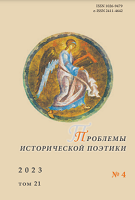Телеологический сюжет в романах «Капитанская дочка» А. С. Пушкина и «Война и мир» Л. Н. Толстого
Teleological Plot in the Novels “The Captain’s Daughter” by A. S. Pushkin and “War and Peace” by L. N. Tolstoy
Author(s): Elena A. FedorovaSubject(s): Christian Theology and Religion, Russian Literature, Eastern Orthodoxy, Theory of Literature, Sociology of Literature
Published by: Петрозаводский государственный университет
Keywords: A. A. Ukhtomsky; A. S. Pushkin; L. N. Tolstoy; novel; teleological plot; motif; dominant; chronotope; military short novel; tradition;
Summary/Abstract: The novels “The Captain’s Daughter” by Pushkin and “War and Peace” by Tolstoy are in the article as works with a teleological plot, which includes the motifs of the test, the choice of the hero and his movement towards salvation. During the choice, the dominant of the hero or people is revealed, based on self-affirmation or self-sacrifice (the “ugliness” vs. “goodness” opposition). In the novels of Pushkin and Tolstoy, the “family thought,” associated with the national-heroic theme, is affirmed, the people appear in them as a conciliar personality. The doctrine of A. A. Ukhtomsky (1875–1942) about the dominant, which he created based on the works of Dostoevsky and Tolstoy, allows us to reveal the ethical perspective of the analyzed novels. Zurin and Shvabrin become Grinev’s “doubles” at the first stage of his life’s journey, Napoleon and Dolokhov - become Pierre Bezukhov’s counterparts. Freeing himself from the “double,” the hero who makes a moral choice, according to Ukhtomsky’s teachings, takes the path of the “interlocutor” and returns to the previous moral dominant, which was formed in the family. An example is Masha Mironova and Pyotr Grinev, Andrei Bolkonsky and Natasha Rostova. Pierre Bezukhov does not have a moral guideline in his family; Andrei Bolkonsky, Platon Karataev and Natasha Rostova help him embark the path of “decency.” The greatness of Kutuzov, according to Tolstoy, is that he has a conciliar consciousness and brings “simplicity, goodness and truth.” It is not by chance that the Battle of Borodino and the connection of the destinies of the main characters take place between the Orthodox holidays of the Assumption and the Nativity of the Blessed Virgin Mary: in Orthodoxy, the abode of the Blessed Virgin Mary is Russia. The Pushkin’s and Tolstoy’s novels trace the traditions of ancient Russian military short novels and hagiographic literature (symmetrical composition, symbolism of light), and affirm the ideal of the world as a family turned to the Gospel Truth, and a conciliar personality walking the path of salvation and helping others find this path.
Journal: Проблемы исторической поэтики
- Issue Year: 21/2023
- Issue No: 4
- Page Range: 102-129
- Page Count: 28
- Language: Russian

